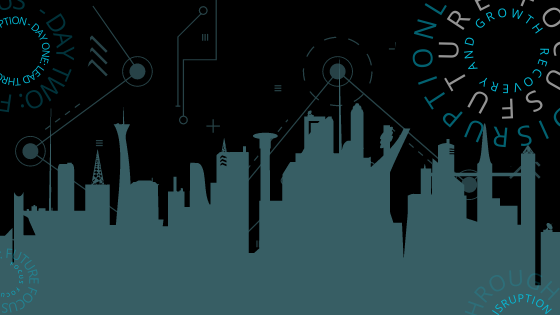When it comes to the future of our cities, business mavericks like Elon Musk have captured the public imagination with the potential that technology has to define a landscape. With the world of logistics, delivery and supply chain completely altered by the pandemic, how transport connects has become more important than ever.
At Chief Disruptor LIVE: Virtual April 2021, Nimbus Ninety’s founder and Managing Director, Emma Taylor, interviewed Karla Jakeman, Innovation Lead for Connected Transport at Innovate UK, to learn more about how data and emerging technologies are fuelling the future of mobility.
What are the major challenges we’re seeing at the moment when it comes to transporting goods and people around the world?
I think the major challenges are the four “Cs”. The first is cost. For innovations to get into the market takes a lot of funding as it is very expensive. The next item is choice. We have got to get that message out through communications as much as possible to get that holistic approach. It is about making smart choices which is down to us as consumers to make those choices as much as possible. However, that depends on receiving the information to make those choices. We will get that information through connectivity which is getting better but it is still a barrier. We need more connectivity through sensor tech, facial tech, and by getting people to places, all these different aspects that are part of the meaning of “connectivity”. We also need courage. Courage to step outside our zones and take risks because that is a huge barrier. And finally, a huge challenge is now Covid. We never expected ministers to encourage lone travel when we had spent years encouraging people to take public transport and travel together. It unravelled some of the work we had done, but it was necessary at the time. We now have got to use innovation to get ourselves out of that challenge.
Looking at those major challenges you’ve outlined, how can connected transport transform the transportation of goods and people on a global scale, or even on an island scale?
Connected transport is about the end-to-end journey. For both people and goods, it starts when you think you need to travel, all the way to after you have travelled. It’s a very wide area: it ranges to 5G, active travel, micro-mobility, smart IoT, and sensor tech, which is going to provide better information for people to make those informed choices. That data is going to help make roads safer, such as allowing cyclists to go first at traffic lights. We are going to see micro-mobility on smart scooters and its use at fleet management centres which will change everything. This connectivity will also touch on commercial drones, affecting how deliveries are received which will reduce empty running and inefficient driving. The whole world of connected transport, from buying a ticket, to collecting a parcel, is vast.
So how has Covid-19 and Brexit affected innovation?
There were two key ways. Firstly, we saw the repurposing of existing solutions from other challenges, and secondly, we saw an increase in speed which helped these innovations get out there. People were thinking outside of the box to support and collaborate with one another with organisations from different industries coming together which was amazing to see. Collaboration is so important, when competitors come together for the common good of society it is great.
Where do you think the exciting innovations are? If we look closer to home in the UK, where are they at ground level and where are they going?
Well, at Innovate UK’s recent Geospatial Commission competition, we saw some fantastic projects. The four themes were active travel, mobility of service, supply chains, and capacity. Projects that came out of that included a digital town, a project around active travel and safety, and an asset management project about the environmental costs of empty haulage vehicles. The competition produced 28 great projects. What amazed us were the variety of geospatial data that was used with the data coming from different sources, places, and formats. That geospatial element will become massive when it comes to connected transport.
Can you bring those to life for those of us who are further behind on those innovations?
So a project example: they repurposed a former innovation idea by incorporating satellite technologies with wayfinding. Wayfinding is about looking at where you need to get to and having that element of choice. It has been repurposed specifically for accessibility purposes to make sure everyone has the opportunity to travel, regardless of their personal situation. We have also had projects around digital twinning in certain geographical areas which will help local authorities with their transport planning.
What do you think is the role of Innovate UK, as we move into a new world and how should we all be part of it?
Innovate UK is the government’s innovation agency so we are a government body. Our aim is to get economic growth through funding and connecting, as well as getting solutions to social, environmental, and economic challenges. So if you are looking to collaborate or if you have a great idea, get in touch with our knowledge challenge network, get yourself to briefing events, and get involved in competitions. You may have the golden piece of the jigsaw that someone else is looking for. Regardless if you are an academic, a business, a catapult, or a charity, you will view a problem from a different perspective. You can help get involved in that collaboration which is so important.





Leave a Comment